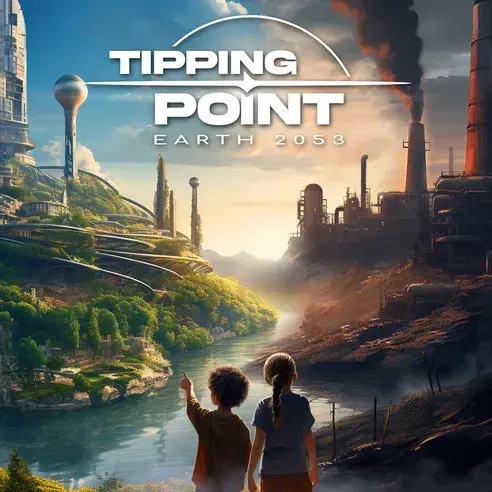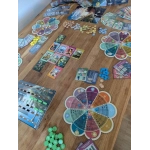In Earth 2053: Tipping Point, players represent countries that work together to prevent a global climate catastrophe.
The main scoring happens on a physical seesaw board where "prevention" tokens are placed on one side and "pollution" tokens on the other. Filling the prevention side lets all players win (with optional placements based on who contributed the most). However, if the board tips towards the pollution side, all players lose.
Each player has their own country board with their own special ability, where they track their economy and their population's need fulfillment. Increasing the fulfillment levels of certain needs will unlock more and more powerful rewards, but at the same time threatens to create additional pollution.
One of the major goals of the game is to use your country's board setup to create "influence" tokens which can then be used to prevent climate events from (such as species extinction) from occuring in a negotiation about who is willing to invest how much per event. Stopping these events creates prevention points, while failing creates pollution.
The primary way of increasing need fulfillment is playing cards onto a grid shared between all players. Some cards have special effects depending on which other cards they are played adjacent to. Playing cards of the same category next to each other comes with its own set of bonuses.
A game of EnlightenFun
Earth 2053: Tipping Point fuses gameplay attraction with educational value. For this reason, it goes beyond being a game for entertainment or a serious game. We call this new category of games "EnlightenFun".
Gameplay attraction of "Earth 2053: Tipping Point"
Keep the Balance Steady Before it Tips
- The central mechanic of the balance requires players to collaboratively solve disasters to prevent them from generating pollution tokens at the end of the round. This creates constant tension and urgency in the game, as overloading the pollution side results in immediate loss.
-
Strategize on solving Disasters - Players must decide together which disasters to tackle and solve. This fosters an interesting cooperative team dynamic.
-
Need Tracks Management - Players must play their cards in such a way that they use the need tracks to obtain the resources they need. This mechanic challenges players to strategically manage their cards and resources.
-
Combine Cards for Connection Bonuses - By skillfully placing project cards next to cards of the same category, synergies and bonuses can be achieved. This mechanic rewards strategic thinking and encourages planning ahead to achieve maximum efficiency and benefits.
-
Skillful Use of Credit Budgets - For the various need categories, players have separate budgets available from which they can draw to play cards. This mechanic promotes sophisticated resource management and strategic flexibility to meet the changing demands of the game.
-
Clever Disaster Placement - Players strategically place disaster cards in the common grid on a suitable side of a project card to effectively resolve them. If there is no suitable side of a project card, players are free to place them. Therefore, a strong strategy is to intentionally block placement spots for an opponent.
-
Think for the Neighbor to the Left - During the income phase, players strategically pass two cards to their clockwise neighbor. They must put themselves in their teammate's shoes and assess which cards will bring the greatest value to their teammate.
Educational Value of "Earth 2053: Tipping Point"
Understanding Environmental Impact
The game educates players on the consequences of pollution and environmental neglect, emphasizing the importance of sustainability and eco-friendly practices.
Collaborative Problem-Solving Skills
Players develop teamwork and collaboration skills by working together to solve disasters, fostering a sense of community and shared responsibility.
Strategic Resource Management
The game teaches players about the importance of managing resources efficiently, mirroring real-world economic and environmental challenges.
Critical Thinking and Decision Making
Players are encouraged to think critically and make strategic decisions to balance immediate needs with long-term goals, enhancing their problem-solving abilities.
Awareness of Climate Change
The game raises awareness about climate change and its effects, educating players on the urgent need for action to mitigate environmental damage.
Educational Content Integration
"Earth 2053: Tipping Point" integrates scientific facts and real-world scenarios, providing an engaging platform for learning about environmental science and policy.
Encouraging Innovation
Players are motivated to come up with innovative solutions to complex problems, fostering creativity and out-of-the-box thinking.
Simulating Real-World Challenges
The game simulates real-world environmental and socio-economic challenges, offering players a deeper understanding of the interconnectedness of global systems










